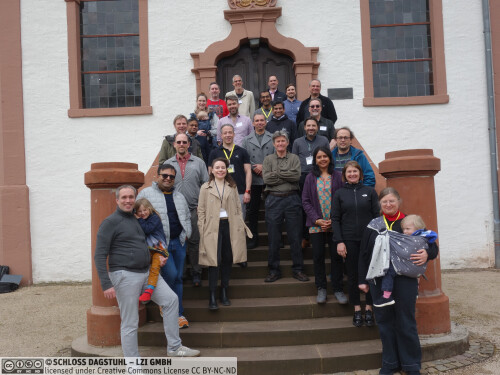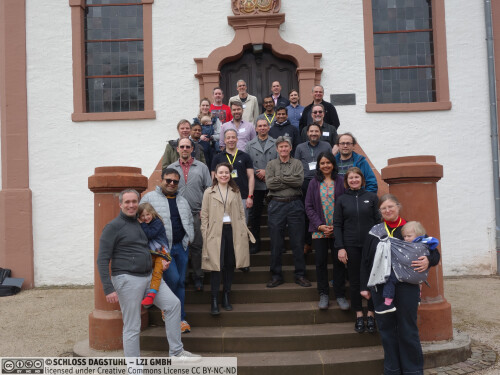Dagstuhl-Seminar 23132
AI-Augmented Facilities: Bridging Experiment and Simulation with ML
( 26. Mar – 31. Mar, 2023 )
Permalink
Organisatoren
- Peer-Timo Bremer (LLNL - Livermore, US)
- Michael Bussmann (Helmholtz-Zentrum Dresden-Rossendorf - Görlitz, DE)
- Tom Gibbs (NVIDIA Corp. - Santa Clara, US)
- Brian Spears (LLNL - Livermore, US)
Kontakt
- Michael Gerke (für wissenschaftliche Fragen)
- Simone Schilke (für administrative Fragen)
Programm
The Dagstuhl Seminar connected three traditionally different communities: experimental and computational scientists, experts in HPC and edge computing, and machine learning researchers, to discuss a new vision for future AI-augmented facilities. The full report summarizes the activities during the week of in person discussion including the outline of a position paper that is under development to publish the joined findings. The seminar proceeded in roughly three stages: an introduction with two keynotes and a general discussion on the goals, an expansive phase of collecting ideas and defining the scope of the position paper, and finally working groups on creating explicit outlines and collecting materials for various sections of the paper.
 Peer-Timo Bremer, Brian Spears, Tom Gibbs, and Michael Bussmann,
Peer-Timo Bremer, Brian Spears, Tom Gibbs, and Michael Bussmann,
Recent advances in technology have enabled tremendous progress in experimental and computational science as well as their corresponding large-scale facilities. However, the connection between state-of-the-art predictive computation and world-class experimentation remains slow, often taking weeks or months to use data from each setting to guide the other. Modern scientific investigation needs a far stronger integration between these areas to enable a more efficient, faster, and more flexible process. In this context, recent advances in machine learning and computer science promise to enable an unprecedented convergence of traditionally disparate branches of science and technology. In particular, various application areas have already expressed the vision of a fully integrated, self-driving facility in which ongoing experiments are immediately processed on resources at the edge, automatically coupled to matching simulations at affiliated HPC centers, and promptly adjusted to achieve maximal impact. However, while the technical capacity for this vision likely exists today, initial examples are largely driven by heroic efforts of individual projects and limited to highly specific use cases. These teams invariably are struggling to solve the corresponding challenges in isolation all the while likely duplicating efforts from other areas.
This Dagstuhl Seminar will bring together a diverse set of stakeholders from the various relevant areas – experimental and computational scientists, experts on edge and HPC computing, and machine learning and computer science researchers – to jointly develop a strategic vision on how to move towards AI-augmented facilities in a unified manner. This will include a range of different application areas from high energy density physics to life sciences and additive manufacturing that all depend on large-scale experimental and computing facilities that could greatly benefit from a more automated and integrated approach.
 Peer-Timo Bremer, Michael Bussmann, Tom Gibbs, and Brian Spears
Peer-Timo Bremer, Michael Bussmann, Tom Gibbs, and Brian Spears
- Niko Bier (DLR - Braunschweig, DE)
- Martin Boehm (Institut Laue-Langevin - Grenoble, FR)
- Peer-Timo Bremer (LLNL - Livermore, US) [dblp]
- Michael Bussmann (Helmholtz-Zentrum Dresden-Rossendorf - Görlitz, DE) [dblp]
- Sunita Chandrasekaran (University of Delaware - Newark, US) [dblp]
- Kyle Chard (University of Chicago, US) [dblp]
- Annika Eichler (DESY - Hamburg, DE) [dblp]
- Rafael Ferreira da Silva (Oak Ridge National Laboratory, US) [dblp]
- Roger French (Case Western Reserve University - Cleveland, US) [dblp]
- Marina Ganeva (Forschungszentrum Jülich, DE) [dblp]
- Tom Gibbs (NVIDIA Corp. - Santa Clara, US) [dblp]
- Maria Girone (CERN - Geneva, CH) [dblp]
- Shantenu Jha (Brookhaven National Lab - Upton, US & Rutgers University - Piscataway, US) [dblp]
- Thomas Kühne (Universität Paderborn, DE) [dblp]
- Ravi Madduri (Argonne National Laboratory - Lemont, US) [dblp]
- Derek Mariscal (LLNL - Livermore, US) [dblp]
- Arvind Ramanathan (Argonne National Laboratory - Lemont, US) [dblp]
- Andrea Santamaria Garcia (KIT - Karlsruher Institut für Technologie, DE)
- Martin Schulz (TU München - Garching, DE) [dblp]
- Brian Spears (LLNL - Livermore, US) [dblp]
- Matthew Streeter (Queen's University of Belfast, GB) [dblp]
- Jeyan Thiyagalingam (Rutherford Appleton Lab. - Didcot, GB) [dblp]
- Brian Van Essen (LLNL - Livermore, US) [dblp]
- Jean-Luc Vay (Lawrence Berkeley National Laboratory, US) [dblp]
Klassifikation
- Computational Engineering / Finance / and Science
- Distributed / Parallel / and Cluster Computing
- Machine Learning
Schlagworte
- Machine learning
- HPC
- Edge
- Experimental facilities



 Creative Commons BY 4.0
Creative Commons BY 4.0
